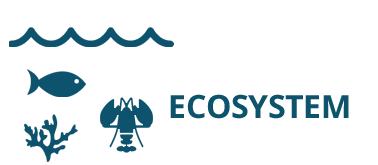Few Ecosystem Studies
In the Northeast, research into biological effects of ocean and coastal acidification (OCA) has been limited mainly to laboratory experiments using single species. Few studies of OCA in ecological communities and ecosystems have been conducted. Importantly, understanding how an individual species may be affected by OCA is not the same as being able to predict how the ecosystem will be affected, and many challenges exist in attempting to extrapolate from single-species studies to ecosystem-level effects. A more robust strategic approach to OCA research that includes ecosystem-level, multispecies designs, takes advantage of natural CO2 gradients in marine habitats, and integrates results from laboratory and field experiments is needed in order to better understand and predict ecosystem responses to future CO2 conditions. Food web analyses and ecosystem modeling can be used to help to predict ecosystem impacts, but these still require detailed information about the individual species in the ecosystem. For example, research indicates that OCA's impact on zooplankton species may vary in severity depending on how much food is available; abundant food gives the zooplankton more energy with which to cope metabolically with the scarcity of calcium carbonate. Looking into the future will require better understanding of what watershed, ocean, and atmospheric conditions may be, and integrating human activities into ecosystem projections remains a challenge.
Need to Consider Other Changes Beyond OCA
In addition to ocean and coastal acidification, marine species in the coming century will face other changes, including rising temperature, declining oxygen levels, pollutants, coastal habitat changes, and decreasing salinity. These factors have complex influences and can interact with one another. As a result, studies focused on OCA alone are inadequate for predicting how ecosystems will respond to climate change. Research into the combined effects of these different stressors is needed to evaluate how they work in concert to affect species and ecosystems.
Search the NECAN Reference Library:
Ecosystem










How Does Coastal Acidification Affect Marine Life?
Fish
Zooplankton
Crustaceans
Phytoplankton
Mollusks
Seaweed and Seagrasses
Other Invertebrates
Ecosystem